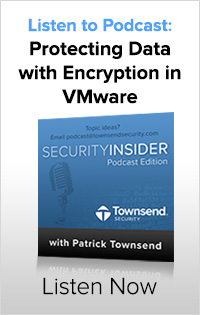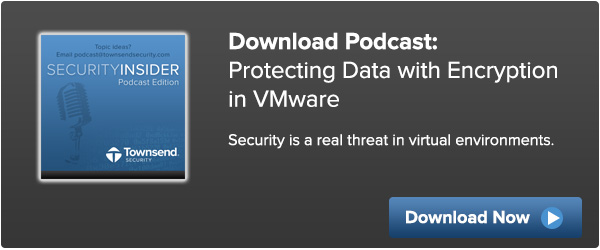Questions and Answers on VMware Encryption Projects
Every business is trying to save money and reduce complexity in their IT departments, and many are accomplishing this today by using virtual machines such as VMware®. While these businesses’ infrastructures are becoming virtual, their security threats are still very much real.
Recently Paul Taylor with Security Insider - Podcast Edition spoke with our founder, Patrick Townsend about encrypting data in VMware, encryption performance, and special encryption and key management concerns for VMware users. Here are a few highlights (download the podcast for the whole conversation):

Paul Taylor: As VMware customers start to work on encryption projects to protect sensitive data, what are the things they worry about? What concerns them?
Patrick Townsend: VMware customers have made a large investment in VMware technologies. This includes, but is not limited to, an investment in the VMware solution stack that lets them run a variety of virtual machines; administer those machines, monitor the health of the virtual environment, and secure the entire infrastructure of virtual machines and VMware itself.
VMware customers also have invested heavily in the talent needed to run a VMware data center, have adopted governance and risk management procedures specific to a VMware environment, and have invested heavily in migrating existing applications to this platform. It’s a large investment but the payoffs are substantial.
So, when approaching an encryption project the VMware customer really wants to deploy products and solutions that run naturally in VMware. It is painful and concerning to have to deploy solutions that don’t fit naturally.
Paul Taylor: I know that Townsend Security has encryption and key management solutions for VMware customers. Can you talk a little about those?
Patrick Townsend: For any encryption project there are really two major components:
- The encryption of the sensitive data, usually in a Windows or Linux virtual machine
- The protection of the encryption keys
An effective strategy in the VMware environment has to address both of these. I think we are doing this very well with our encryption solutions for VMware.
First, our Alliance Key Manager for VMware product provides for the creation, management, and protection of encryption keys in a VMware virtual machine. It runs the same FIPS 140-2 compliant key management solution that we offer in our Hardware Security Modules (HSMs). So VMware customers can get encryption key management right without having to go outside of their VMware infrastructure.
Second, all of our encryption solutions that are deployed to protect sensitive data run in the VMware platform and talk to our key manager. For example, you can deploy our SQL Server Transparent Data Encryption solution for automatic SQL Server encryption in a Windows Server virtual machine, and it will talk naturally to our key management server also running in a VMware virtual machine. It’s a perfect match for the VMware customer.
Paul Taylor: Encryption has a reputation for being the hardest part of security. How do you address that concern?
Patrick Townsend: Yes, you are certainly right about encryption having a reputation for being hard and expensive to deploy. However, things are really different today. I’ll give you a couple of examples:
First, our VMware key management solution will soon be released as a ready-to-use key manager. This means that the first time you boot our Alliance Key Manager For VMware solution it will ask you a few questions, create a complete configuration for the key manager, and start the service. You literally have a functioning key server in a few seconds. What 5 years ago required multiple engineers and weeks of installation and configuration now gets done in a blink.
Secondly, our client-side encryption applications and SDKs are also designed for rapid deployment. For example, SQL Server Transparent Data Encryption also deploys through a standard Windows install process. Again, you answer a few questions, install credentials into the Windows Certificate store, run a handful of SQL Server commands, and you are fully protected with encryption. It is incredibly easy.
Paul Taylor: I think everyone worries about performance when you talk about encryption. How well do your encryption solutions perform in VMware?
Patrick Townsend: Performance impacts are a natural thing to worry about. Encryption is a CPU intensive task, and it will have some effect on your application or database. Fortunately modern encryption libraries are very efficient and the impact is usually very modest. Back to our example about SQL Server TDE encryption, the average customer will experience about a 2% to 4% impact when activating TDE encryption. This is very manageable. Large SQL Server databases can pose a performance issue with TDE which is why we also support Cell Level encryption with SQL Server.
We always encourage our customers to try our encryption solutions before they make a full commitment. We make it very easy to do a proof-of-concept project with encryption. Our free evaluations let you take it for a spin and evaluate the impacts yourself.
Paul and Patrick also cover topics on high availability, business recovery, and compliance regulation concerns for protecting data in a VMware environment. Be sure to download the podcast to hear the rest of their conversation:

